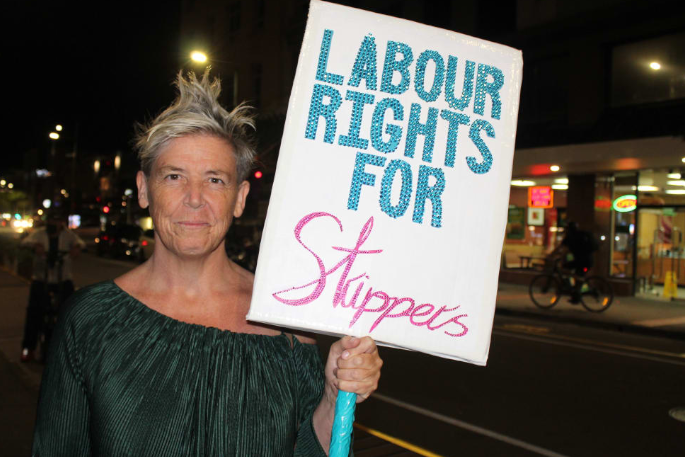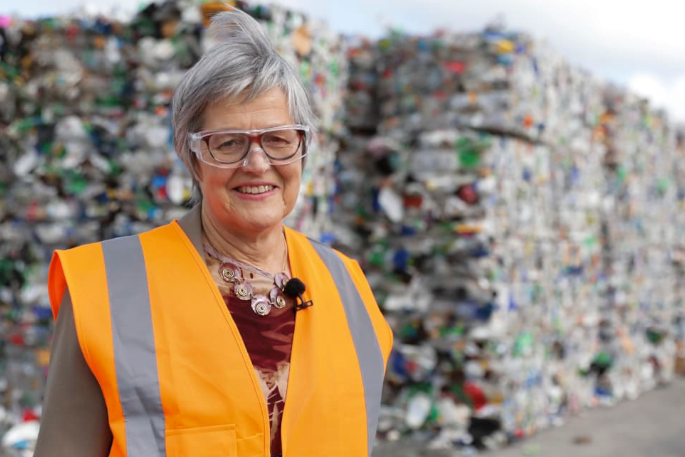Two of the longest-serving members of the Green Party caucus farewelled Parliament on Thursday, delivering their valedictory statements.
Eugenie Sage and Jan Logie, who became MPs in 2011, served roles in the Labour-led coalition from 2017-2020, but have decided to retire at the election.
RNZ spoke to both of them ahead of their valedictories, asking them to reflect on their time in Parliament, what work they would like to see continue, and how they think they would be remembered.
'I don't think I'll be silent' - Eugenie Sage
In her office, with Parliament TV playing in the background, Eugenie Sage admitted she had not given her valedictory too much thought. The House had been called into urgency, and Sage was still speaking to legislation going through.
"I haven't really had a chance to come to terms with leaving. Writing a valedictory is a good way of trying to do that, but we have been very busy," she says.
Before entering Parliament, Sage was an Environment Canterbury councillor, but lost the role in 2010 when the government replaced the council with commissioners.
She says her first few years in Parliament were "debilitating" as there was not a lot of opportunity to achieve change, but she began to see a "pulse" for increased support for the Greens in 2017.
Sage, who admitted she never intended to be an MP, certainly had no idea she would become a minister. She says 2017 was a combination of heartbreak, at losing co-leader Metiria Turei and MPs Mojo Mathers and Denise Roche, but also elation at being part of government for the first time, and being a minister.
In 2017, Sage was appointed minister of conservation, minister of land information, and associate minister for the environment, with a responsibility for waste.
Of those portfolios, she says she was most proud of associate environment, and of kickstarting a programme of work with a small team in the Ministry for the Environment which the government continues to implement - except for one.
"The design of the container return scheme, that really needs to be put back on the agenda because we lag so far behind internationally. We've got a rubbish record on waste."
Sage was instrumental in the ban on single-use plastic bags, which started in 2018. At the time, it had fierce opposition from the likes of National and ACT - and many consumers. Sage says it was a change which needed to be made.
"The plastic bag ban highlights the enthusiasm for change, and it has become a matter of everyday life."
Sage lost her ministerial portfolios in 2020, when Labour won its majority. Since then, there have been three ministers for Conservation: Kiri Allan, Poto Williams, and the incumbent Willow-Jean Prime.
Sage says the turnover in the role was unfortunate, but was glad the role was finally in cabinet (Prime kept the portfolio when shuffled into cabinet in April).
"It's seen as a junior ministerial portfolio. It shouldn't be."
She says her biggest regrets were over things she tried to introduce but were voted down, such as a ban on new mines.
She was also frustrated that big law changes could be made without cross-party consensus, leaving them vulnerable to being overturned by a change in government.
"You get flip-flop policy-making, law-making, that just creates uncertainty. It's not a good use of all the investment of some others' time and the officials' time as well. We need to get better at developing consensus. James Shaw did that with the Zero Carbon Bill. That is an enduring framework, and that's quite a major achievement."
She did not, however, regret her controversial attempt to entrench the Three Waters legislation, which at the time caused a constitutional headache. Sage insists water must stay in public ownership.
"What we're doing with this legislation is corporatising it, which makes it much easier to privatise, if a future government wanted to do that."
She says much was at stake for biodiversity if future governments did not take climate change seriously, with more frequent mast years and seed falls.
"Rat and mouse plagues leads to stoke plagues leads to more predation. We need to protect the climate, and we need to protect nature, and we need to invest more in protecting nature," she says.
Sage says her speech would focus on thanking volunteers and community organisations using their voices to demand better for nature - spaces she was likely to return to.
"There are so many issues that need attention. I don't think I'll be silent, but I'm not sure how I will use my voice when I've left here."
Asked how she thinks she'll be remembered, Sage says it was for others to judge.
'It's not about me, it's about the work' - Jan Logie

Jan Logie. Photo: Supplied/RNZ.
Ahead of her valedictory, Jan Logie says her speech would be a "love letter" to the communities she had worked with before Parliament, during her time there, and would continue to work with.
"In the most difficult times, politically, I wrote valedictories in my head and I thought it would be easy. But it's not."
Logie, the 112th woman to serve as an MP, says when she entered Parliament it was still a "boys' club." She says once, an MP had made Parliament rise and clap the finalists of the Miss New Zealand competition, saying they had spent a "pleasant hour" in his office.
"This kind of snickering, all around Parliament, it was just gross. They may as well have been in smoking jackets with cigars, looking at a pin-up calendar. It was just disgusting," Logie says, with a laugh.
She says Parliament had made progress, but there was still a way to go.
When the Green Party entered into the confidence and supply arrangement with Labout in 2017, Logie was appointed parliamentary undersecretary to the minister of justice, with a focus on domestic and sexual violence issues.
She brought through a bill which created leave entitlements for workers affected by domestic violence.
She says since the law came into force in 2019, she had heard from survivors and organisations about the difference it had made, but also from the bill's initial critics.
"I've also heard from a business person who opposed the bill, who then after it passed was very surprised to find that women in their corporate office, friends and colleagues, actually, were accessing the leave.
"And they had made assumptions about who the bill would be for, and I think saw the value of it when it came to people they actually had relationships with."
When Labour won the 2020 election, Logie lost her undersecretary position, but through the Greens' co-operation agreement with Labour a minister for the prevention of family and sexual violence role was created for Green Party co-leader Marama Davidson.
Logie says it was imperative Te Aorerekura strategy launched by Davidson continued to be backed by successive governments.
"My daughters, I want their kids to be able to look back at this time and go 'I can't believe that's what people used to do to women and kids.' And that's possible for that to get to that point where it's just not a norm in our society anymore. I feel really strongly that we're in the best place that we've ever been to be able to get us there."
Logie has long had a disdain for the theatrics of Question Time, and admitted it was one part of Parliament she would not miss.
"I studied theatre at university, and I have a great love of good theatre. And Question Time is not good theatre," she says, admitting as a "true lesbian cliché" she sometimes switched off by looking at pictures of her cats.
She announced her retirement at the end of 2022, but has not had a quiet final few months at Parliament. As the Green Party's musterer (its equivalent of a whip), Logie was tasked, along with the Greens' chief of staff, with leading the probe into Elizabeth Kerekere's behaviour. Kerekere resigned from the party during the investigation.
Choosing her words carefully, Logie described the situation as heartbreaking, but has no regrets over how the process was handled.
"I genuinely believe that having a formal process provides safety for everybody, rather than just the political intervention without transparency. We followed a process, in this situation, I'm really sad that Elizabeth chose to resign and walk away before that was able to progress."
Along with Kerekere, Logie has been one of Parliament's most vocal advocates for LGBT rights. As one of twelve openly LGBT MPs this term, she says she would reflect on the progress made in getting specific law reforms in terms of human rights for trans people, and the self-identification changes to birth certificates.
"We had an easy political consensus around it, because it made sense," she says.
She implored MPs not to take the progress made for granted, and not to fall for the fearmongering and scapegoating of trans people which had made its way to New Zealand.
"It feels hard to hold that optimism, right at the moment. We're seeing not just the trans community being a target, but Māori and other communities and other women online. However, I have to balance that with the amazing things I see happening in our communities."
Logie says she would continue to work with those communities.
"I've always been political, and I can't see that changing. It's not a partisan thing, it's about the issues I care about. So, sorry in advance to my colleagues!"
She says she was leaving Parliament with a sense of optimism for the Green Party. In fact, it is exactly why she is leaving.
"My colleagues have got this. I don't need to be here to be doing the work anymore, because I totally trust them to be doing it and doing it really, really well. So that is a nice place to leave."
She has not given any thought on how Parliament will remember her.
"It doesn't need to, it's not about me. It's about the work. I'm imminently replaceable, and that's the strength of this place."



0 comments
Leave a Comment
You must be logged in to make a comment.